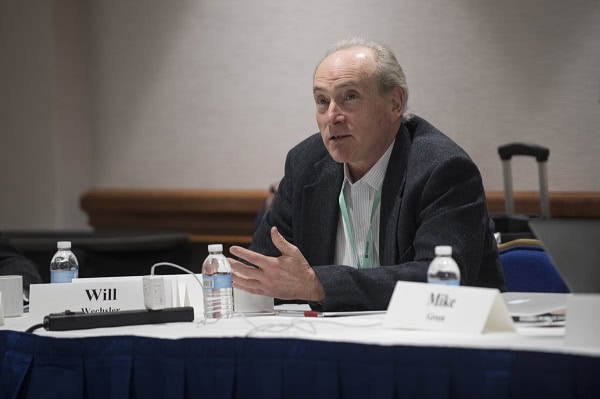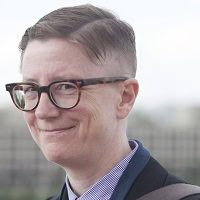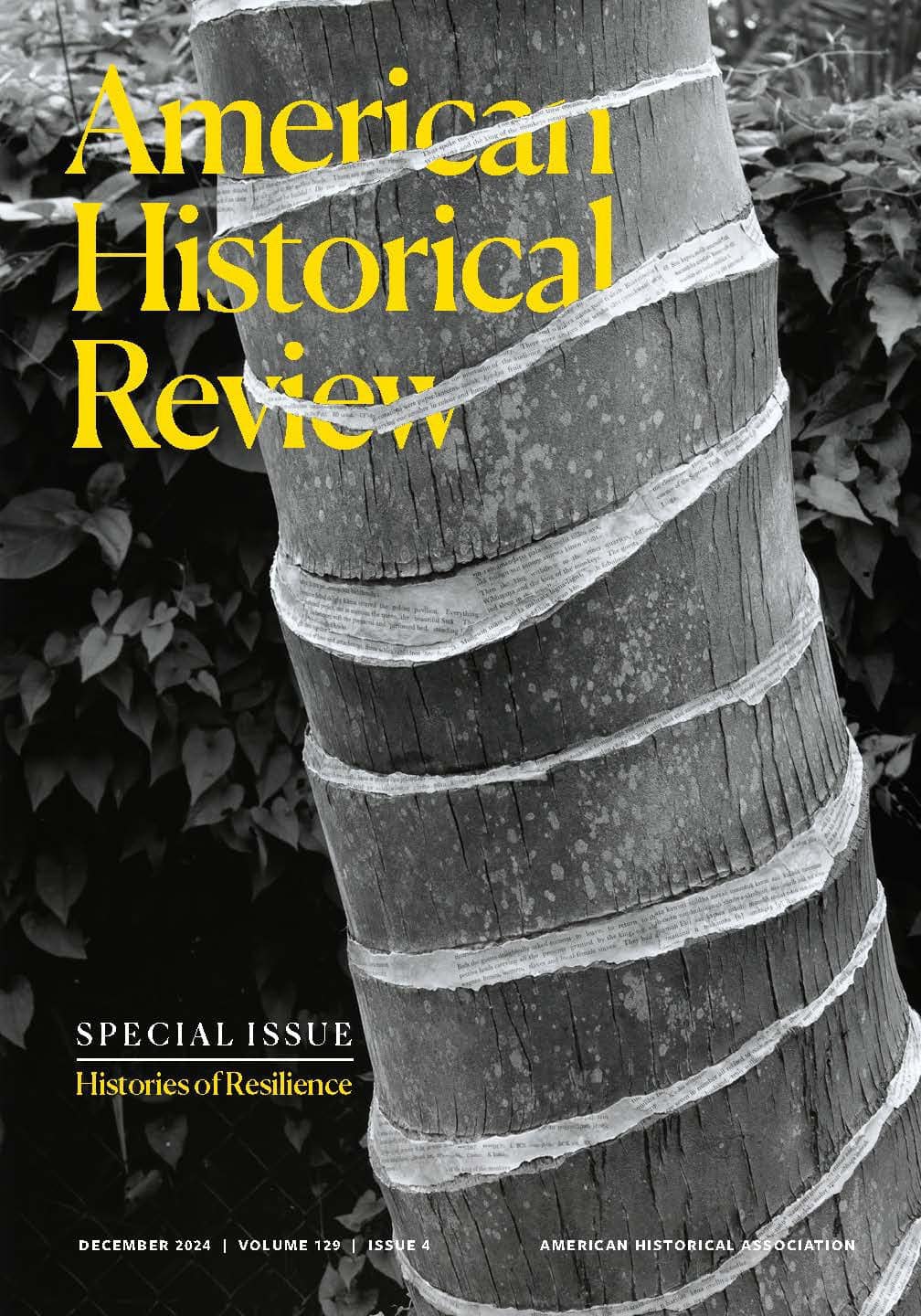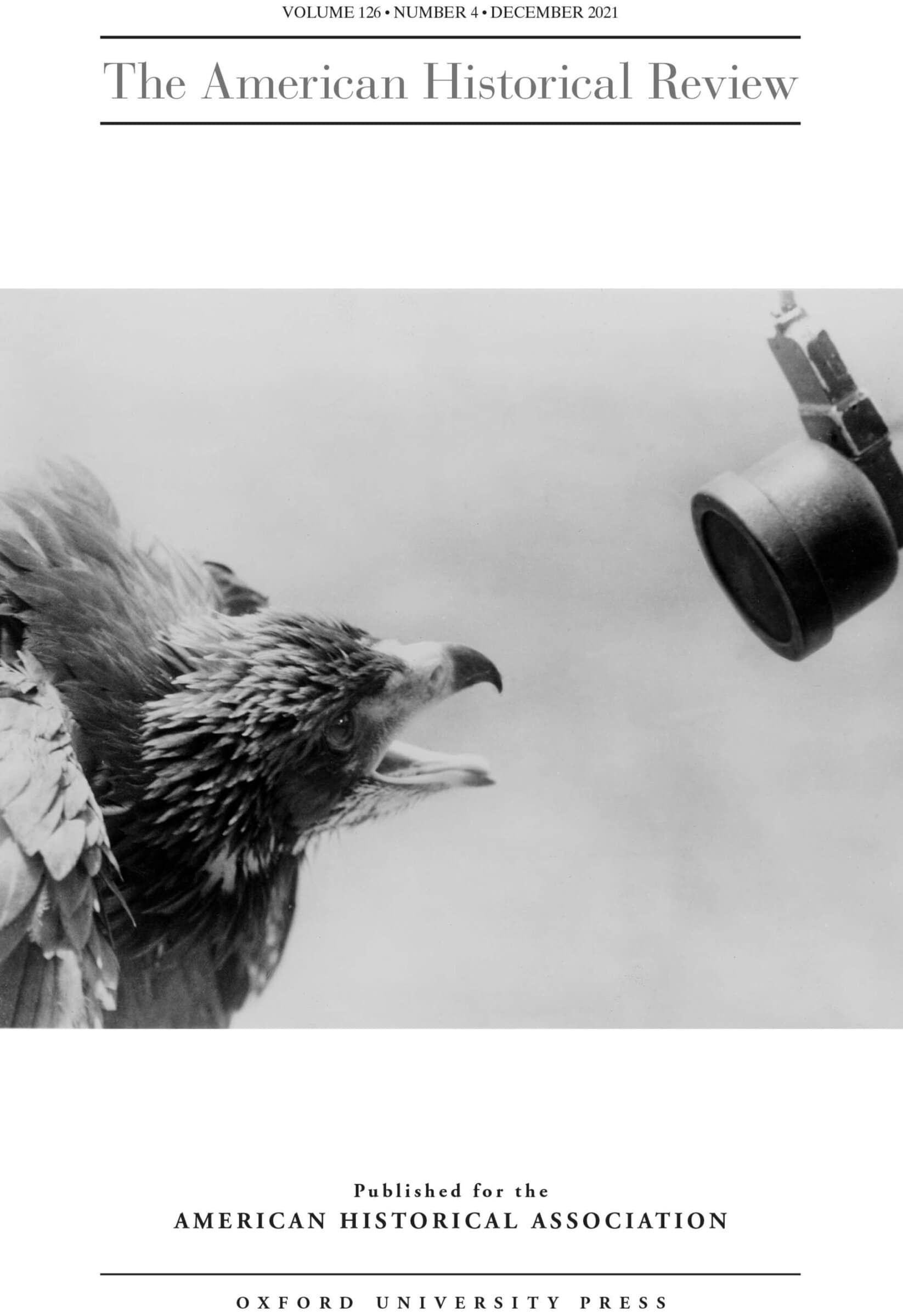When current AHA president Mary Beth Norton turns over the Association gavel to him at the 2019 annual meeting in Chicago, Georgetown University historian John R. McNeill will begin his year-long tenure as AHA president. A pioneer in environmental and global history and the recipient of a raft of fellowships and prizes, he is the author of Mosquito Empires: Ecology and War in the Greater Caribbean, 1620–1914, which won the AHA’s 2010 Albert J. Beveridge Award, and, most recently, co-author (with Peter Engelke) of The Great Acceleration: An Environmental History of the Anthropocene since 1945. Serving as a historian on the multidisciplinary Anthropocene Working Group, McNeill has even contributed to our understanding of geologic time and, in a broader sense, to the urgency with which we must consider the fate of the planet we call home.

John McNeill at the 2018 AHA annual meeting, in Washington, DC. Marc Monaghan
McNeill is a third-generation academic historian. His father was William H. McNeill of the University of Chicago, who was also elected AHA president, serving in 1985. And his grandfather, John T. McNeill, was an esteemed church historian and authority on John Calvin.
Cerebral yet down to earth, McNeill is known in the AHA headquarters for dropping by one hot day last summer to talk with staff members in an aloha shirt. Still savoring a student’s successful dissertation defense earlier in the day, he spoke with Perspectives at length about inspiration, mentorship, and how global forces shape historical inquiry.
You’ve written about mosquitoes, but I’d like to know how you got bitten by the history bug.
I was bitten by the history bug, I would say, during my undergraduate years, but it took some time. I was originally mainly interested in mathematics and physics, and I was briefly a mathematics major, until the professor who, in my freshman year, told me that I absolutely had to be a math major, at the end of my sophomore year told me that I should probably reconsider. And he was right!
So in my junior and senior year, I was doing mostly anthropology and history. I believe in the fall of my senior year, I decided to apply to history graduate school, for want of a better idea.
“I would expect that there are or were hundreds of historians in the US for whom military experience in World War II was important.”
In going into history, were you influenced by your father?
Certainly, in ways that are not always that easy for me to recognize—that is to say, he neither encouraged nor discouraged my migration into the field of history. He would answer questions if I asked them, but he would not offer advice or opinions.
If I were to indulge, and I will do this only reluctantly, in self-examination, I would say that I could tell when I was 20, which is when I made this decision [to become a historian], that if I wanted to have a lot to talk about with my father in the years and decades to come, the only reliable way to do it was to become a historian.
Your father was also a veteran of World War II. And right now, we’re seeing that generation of historians passing away. Do you have any thoughts about how that cohort of historians shaped history as a field of inquiry and what we might be losing now that they’re leaving us?
In my father’s case, the fact that he was a veteran of the US Army from 1941 to ’46 was a huge influence on his mind. In much of his work, he took military [life] seriously, and I won’t say necessarily sympathetically, but [with] a greater understanding than otherwise could have belonged to the subject. I think his experiences in the military, which took him to Hawaii, took him to the Caribbean, took him to North Africa, took him to Greece, helped him develop his global perspective.
And I would expect that there are or were hundreds, maybe more than hundreds, of historians in the US for whom military experience in World War II was also important, although probably in different ways. I would say that in several cases, [these] historians learned a language for military duty; they spent a lot of time, particularly after the war, as the US military occupations took shape, in one country and developed a basic familiarity and also an interest in, let us say, Japan. I think there’s probably a dozen or more US historians of Japan whose lives took that particular trajectory.
Who were your first mentors?
In my undergraduate days, I would say the most important example for me was a professor at Swarthmore [College] named Paul Beik, who was a specialist in French history but also taught Russian history. I admired him lavishly for his manner, his very gentle soul, very encouraging soul, but also one with severe standards.
When I got to graduate school [at Duke University], the most important figures for me were probably Charles Maier, who was at Duke between his [years] at Harvard, and John Cell. What was important for me about Maier was the depth of his engagement with 20th-century European history. I never took a class from John Cell, but he invited me to team-teach with him around my fourth year. It was a very interesting and intense experience for me. He was a specialist in British and British imperial history, but we were teaching about ancient China and pre-Columbian America—things that neither of us knew anything about.
“I do try to encourage students to be fearless and to be ambitious in what they take on, to avoid writing the definitive work of trivial subjects.”
That was a great experience for me. He legitimized exploration of fields that I had no credentials in, because he had no credentials in them, and yet we were teaching about these things. And that was a liberation for me. I have since taught several things that I know very little about. I tell my students it’s a mutual voyage of discovery.
As regards to mentorship, I do try to encourage students doing senior theses, master’s theses, and PhD theses to be fearless and to be ambitious in what they take on, to avoid writing—particularly PhD students—the definitive work of trivial subjects, which is an inclination that many scholars have.
What was your first AHA annual meeting like?
I actually went to one session of an AHA meeting when I was an undergraduate, because one of my professors was presenting a paper. I went only to this one session. I have to admit, I didn’t find it terribly exciting.
My first one after that was probably, as it is for many, the occasion of my first job interviews. My experience of the AHA was colored by the fact that I had high-stress, hour-long engagements with total strangers, and my whole life and career seemed—seemed—to hinge on the outcomes of these. I know that one of those early ones was in Washington, held, as is often the case, in the two hotels in Woodley Park, because I remember vividly going to the wrong hotel for one of my interviews.
I vaguely, vaguely remember going to see some of the big-name historians in those days—Philip Curtin, Eugene Genovese—and one of the things I learned from that is that even the really big, famous, successful historians are just people like anybody else.
What goals should the AHA have for the next year?
An AHA presidency lasts only one year, and it’s very hard for any president to have much impact on any institution such as the AHA or any profession such as ours in the span of one year. And my observation from my three years as the vice president of the Research Division [2012 through 2014] suggests to me that whatever ambitions a given president might have for doing X, Y, or Z while in office for a year are likely to be overtaken by events. So the position turns out to be much more reactive than one might imagine if one has not witnessed the Council and the AHA mothership in operation.
Climate change “is likely to have an impact on historians’ understanding of causation, by which I mean the array of forces that drive history.”
But if nothing unexpected were to come up in the year 2019, I think that the main agenda that I would like to see the AHA attend to is to broaden its activities and attention more than it has been able to do in years and decades past, so as to include historians operating in all kinds of institutional settings. The AHA just prepared this magnificent [database], Where Historians Work, [which] tells us in detail things that we knew in a fuzzy sort of way [about where history PhDs get jobs]. But the implication of that is that the AHA as a professional organization and as an institution needs to take account of these findings and attend to the interests—intellectual and professional interests—of all these historians in all these different settings. I have been a beneficiary of the AHA’s focus on academia. And I don’t for a moment suggest that the AHA neglect academia. But the fact of the matter is that historians are found in all different settings.
Given your expertise, how you think climate change will affect us in the future—“us” meaning historians—whether in the short term or long term?
Climate change is going to affect everybody. It already is affecting everybody to some extent, but some people around the world much more than others. Beyond that, I think it’s already begun to affect historians by inviting them to take climate shifts and climate shocks more carefully into account when thinking about, teaching about, and writing about history.
I also think that it’s likely to have an impact on historians’ understanding of causation, by which I mean the array of forces that drive history in one direction or another. It is likely to broaden our sense of what the driving forces behind history are. I think it will likely have the effect of broadening our conception of what is relevant to the trajectory of history. History has always been shaped by the world in which historians currently operate, and insofar as climate looms larger in the world in which we operate, then it’s going to loom larger in our understandings of the past.
This interview has been edited for clarity and length.
This work is licensed under a Creative Commons Attribution-NonCommercial-NoDerivatives 4.0 International License. Attribution must provide author name, article title, Perspectives on History, date of publication, and a link to this page. This license applies only to the article, not to text or images used here by permission.


